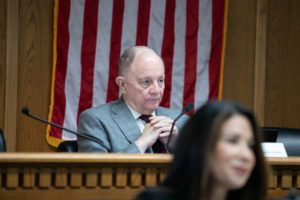Note: The following e-newsletter was sent to Sen. Padden’s subscribers Feb. 9, 2023. To subscribe to Sen. Padden’s newsletter, click here.
One of the key issues needing legislative action during this year’s session is public safety. In recent years, Washington has seen a disturbing increase in crime, some of it encouraged by recent laws passed by the Democratic majority in the Legislature that soften penalties on criminal behavior or make it harder for law-enforcement officers to do their jobs to protect communities.
According to a KIRO-TV story broadcast this week, the Seattle Police Department’s year-end crime report revealed that crime increased by 4% in Seattle last year compared to 2021. Homicides were up 24%. Gun violence reached an all-time high with 739 incidents, beating the record set in 2020. And motor vehicle thefts were at a 15-year high.
Because of the significant increase in crime, people throughout Washington want the Legislature to take action to effectively address it.
Unfortunately, there are signs we won’t see the kind of action that citizens are demanding. The issue of police pursuits of suspects appears to be going in the wrong direction this session.
Sen. Padden listens to a bill hearing during a Senate Law and Justice Committee meeting this session.
Democrats in the Legislature changed state law in 2021 to limit the ability of officers to pursue suspects. Before the change, officers only needed “reasonable suspicion” to initiate a vehicle pursuit of suspects. The new law only allows such vehicle pursuits based on “probable cause.” As a result, officers have been forced to watch criminals drive off. It also has emboldened criminals to commit other crimes and victimize others.
According to the Washington State Patrol, between 2014 and 2020 an average of 1,200 suspects per year fled from police. In 2022, after the pursuit standard was changed to probable cause, 3,100 suspects fled — an increase of more than 150%. Before the change in this law, the statewide record for stolen cars in a single year was 30,000. That climbed by 50% for 2022, to 45,000 stolen vehicles.
Before this session began, I introduced Senate Bill 5034, which would change state law to again make it easier for law-enforcement officers to pursue suspects in vehicles. Unfortunately, Sen. Manka Dhingra, the chair of the Law and Justice Committee, won’t even schedule this bill for a public hearing.
The bill that Sen. Dhingra and the Senate Democrats apparently view as a “fix” to the vehicle pursuit problem is Senate Bill 5533, which actually doesn’t take any action now to address it. Instead, SB 5533 would create a model vehicle pursuit work group within the state Criminal Justice Training Commission, with the work group required to report back to the Legislature by Oct. 31, 2024. In other words, the majority party is choosing to kick this issue down the road for another 18 months or more instead of tackling the problem now, as it should. SB 5533 is now before the Ways and Means Committee.
If you have questions about how to participate in state government this year or thoughts to share on anything in this e-newsletter, please give me a call or send me an email.
Thank you, as always, for the honor of serving as your state senator!
Best Regards,
Senator Mike Padden
Senate committee hears Padden bill to increase penalty for drug possession
Thanks in part to a surprising decision by the state Supreme Court two years ago and a bill passed the Legislature shortly afterward that essentially decriminalizes the possession of hard drugs, our state is seeing a shocking increase in drug-related deaths.
According to the state Department of Health, 2,264 people in Washington died of a drug-related overdose in 2021, compared to 1,731 drug-overdose deaths in the state in 2020 and 1,259 in 2019.
Back in February 2021, in the Supreme Court’s decision in State v. Blake, the justices ruled Washington’s felony drug-possession statute was unconstitutional because it criminalized possession even when a person did not knowingly have drugs.
Two months after this ruling, the Legislature passed Senate Bill 5476 as a temporary fix. This law reduced the criminal penalty for possessing an illegal drug like fentanyl, heroin and methamphetamine from a felony to a gross misdemeanor.
There is general agreement that the action taken by the Legislature in response to Blake did not work. The law created by SB 5476 expires this year, so we need to take new action this session. There needs to be proper leverage to get drug offenders into treatment. A gross misdemeanor charge won’t compel them to get into treatment as much as a felony charge.
The Senate Law and Justice Committee on Monday held a public hearing on a bill I introduced this session that aims to reverse the alarming trend in fentanyl use and fentanyl-related deaths in Washington.
Senate Bill 5035 would make possession or use of illegal drugs like fentanyl, meth and heroin a class C felony, with opportunities for drug court participation.
Spokane resident Molly Cain signed up in support of SB 5035. Cain testified on Feb. 1 during the U.S. House Energy and Commerce Committee’s Health Subcommittee legislative hearing on the fentanyl crisis. Part of Cain’s congressional testimony can be viewed here. Cain’s son, Carson, died of fentanyl poisoning in 2020 at age 23.
The Democrats’ law that decriminalized drugs has been an absolute and costly failure. We need to fix this crisis, and SB 5035 would help us do that, including a chance for offenders to go into drug diversion programs.
Unfortunately, SB 5035 was not brought up for a vote by the Law and Justice Committee as part of the committee’s response to the Blake decision.
Earlier this week, I did radio interviews about the issue of criminalizing possession of fentanyl and other dangerous drugs. You can listen to my interview with KXLY Radio here and my interview with Seattle-based KTTH Radio talk show host Jason Rantz here.
Update on other Padden bills
The 2023 legislative session is nearing the end of its fifth week. Feb. 17 is the last day for Senate policy committees to pass Senate bills, and Feb. 24 is the cutoff date for Senate bills to be approved by the Senate “fiscal committees” – Ways and Means, and Transportation.
Besides the bills mentioned above, several of my other bills have cleared the Senate policy-committee hurdle or are in the Ways and Means Committee. Here is a rundown of these proposals:
- Senate Bill 5032, known as the DUI “lookback bill,” is in Ways and Means after being passed last week by the Senate Transportation Committee. This bipartisan bill aims to reduce impaired driving in Washington by expanding the period for reviewing prior convictions of impaired driving to 15 years, from the 10 years currently in state law, when determining whether a new offense of impaired driving is charged as a felony. Ways and Means has scheduled a public hearing on the bill next Monday at 4 p.m.
- Senate Bill 5033, a bipartisan measure that imposes tougher punishment when a jail guard or prison guard commits the crime of custodial sexual misconduct against an inmate, is on the Senate’s second reading calendar after being passed by the Senate Rules Committee earlier this week. The entire Senate could vote on it any day now.
- Senate Bill 5056 would require someone who is found to be a “habitual property offender” to be sentenced to an additional 24 months in confinement for a Class B felony and an additional 12 months for a Class C felony. SB 5056 was passed this morning by the Law and Justice Committee.
- Senate Bill 5058 would help encourage home ownership in our state by making it easier for smaller condominium buildings to be constructed. It specifically would exempt buildings with 12 or fewer units that are no more than two stories from the definition of multiunit residential building. SB 5058 is on the Senate’s second reading calendar, which means this bipartisan proposal could receive a Senate floor vote soon.
- Senate Bill 5096, a bipartisan proposal that would aid businesses looking to adopt an employee stock ownership plan (ESOP) corporate structure, received a public hearing in Ways and Means Monday.
- Senate Bill 5218 received a public hearing Tuesday in the Ways and Means Committee after being approved by the Senate Health and Long Term Care Committee. The bipartisan bill would provide tax relief to people who require specialized, medically prescribed equipment such as custom wheelchairs. The bill received a public hearing Tuesday in Ways and Means. Former WSU and New Orleans Saints football player Steve Gleason, who suffers from ALS (or Lou Gehrig’s disease) provided written testimony in support of the proposal.
- Senate Bill 5226, which would require the Department of Corrections to prioritize staffing to pursue active warrants for community-custody violators, was passed Tuesday by the Senate Human Services Committee. It now is in Ways and Means.
- Senate Bill 5578, which would address service requirements for appeals of decisions by the state Board of Tax Appeals, was passed this morning by the Law and Justice Committee. It now goes to the Senate Rules Committee.
Spokane Valley teen serves as Senate page
One of the nice things about the legislative session is sponsoring teenagers to serve in the Senate Page Program.
This week I sponsored Micah Smith (in photo above), a 16-year-old Spokane Valley resident. Micah, who is homeschooled, is involved in the Spokane youth symphony orchestra. She also competes on a debate team. I enjoyed chatting with Micah during her week in Olympia. She did a good job as a page and I hope she enjoyed her experience at the Capitol.
The teens who work as Senate pages spend a week at the Capitol and deliver messages and other materials to senators and legislative staff. Pages also attend Page School where they learn about the legislative process.
Students ages 14-16 can serve as a Senate page, though the Legislature has made a one-time exception for the week of April 3-7 for students ages 17-18 who were unable to participate as a page in 2021-22 due to the pandemic. To learn more about the Senate Page Program, click here.
Legislature should not force people to vote
Because elections and voting are important issues for many people throughout Washington, it isn’t surprising to see several bills each session that relate to elections.
Several Senate Democrats have introduced legislation this session that would require – that’s right, require – eligible Washingtonians to vote. Senate Bill 5209 was passed by the Senate State Government and Elections Committee this Tuesday. This measure specifically would require every eligible voter to either register to vote or obtain a waiver from the obligation to register to vote. It also would require that every registered voter return a ballot for each primary and general election.
I oppose this bill and will vote no if it reaches the Senate floor. Voting should be a civic duty, not a required law.
After the State Government and Elections Committee held a public hearing on SB 5209 on Jan. 31, my fellow Senate Freedom Caucus members – 19th District Sen. Jeff Wilson, 31st District Sen. Phil Fortunato and 2nd District Sen. Jim McCune – joined me in publicly criticizing this proposal. As I noted in our news release, compulsory voting is a bad idea. Just as freedom of speech also means the freedom to not speak, our right to vote also means the freedom to not vote, if that is how someone chooses. This bill goes against our rights, our liberties and the freedoms that Americans hold dear. If this bill becomes law, it will take us a step toward authoritarianism. We don’t want to be like North Korea, where every adult is forced to vote – or else.
Earlier this week, I did a Zoom interview with Spokane’s KREM-TV on SB 5209. The interview will be part of a report that is to air later this month.
Bad bill watch: House Bill 1333
Every legislative session, some bills sail through the Legislature unchanged, while other bills have merit but need reworking to become acceptable to a majority of legislators. Then there are bills that are just bad and need to be defeated.
House Bill 1333 is on this dubious list of bad bills. It would establish something called the Domestic Violent Extremism Commission, which would be run by the attorney general’s office. Seven of the 13 members would be appointed by the state attorney general, with another member coming directly from the AG’s office. The governor also would appoint a member, leaving four slots for the four legislative caucuses to fill (one per caucus). If that bill becomes law this year, Attorney General Bob Ferguson would get to choose most of the commission members, and his office would run the meetings. Does that sound fair and balanced to you?
During the public hearing on HB 1333 in the House State Government and Tribal Relations Committee, opponents correctly testified that this proposal is an overreach of government and might chill freedom of speech. As one noted, this bill compares neo-Nazism with someone who considers themselves a patriot and will make people afraid to speak their opinions for fear of being labeled or penalized as a domestic violent extremist.
This troublesome measure is now in the House Appropriations Committee after being approved by the state government committee last week. If it reaches the Senate, you can be assured that I will strongly oppose it.
Contact us!
If you have a question or concern about state government, please do not hesitate to contact our office. During the session we are conducting business from our Senate office in Olympia. We are here to serve you!
Phone: (360) 786-7606
Olympia Office: 215 Legislative Modular Building, Olympia, WA 98504-0404
Email address: Mike.Padden@leg.wa.gov
PLEASE NOTE: Any email or documents you provide to this office may be subject to disclosure under RCW 42.56. If you would prefer to communicate by phone, please contact Sen. Padden’s Olympia office at (360) 786-7606.
To request public records from Sen. Padden, please contact Randi Stratton, the designated public records officer for the Secretary of the Senate and Senate members.















